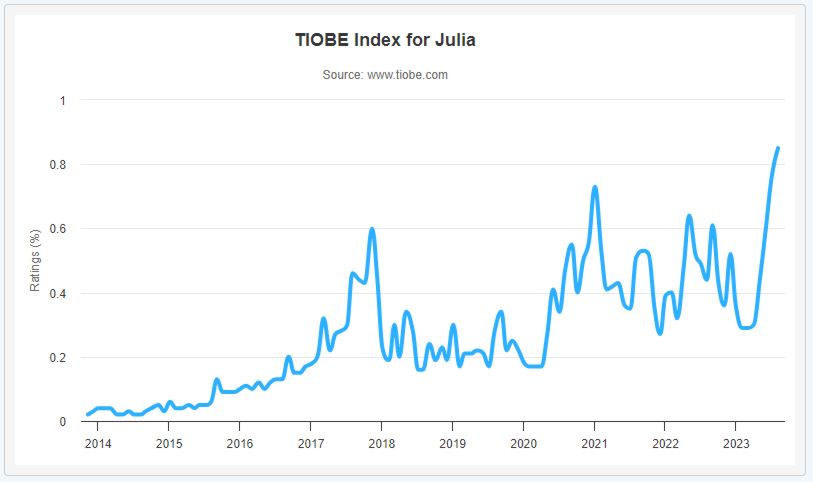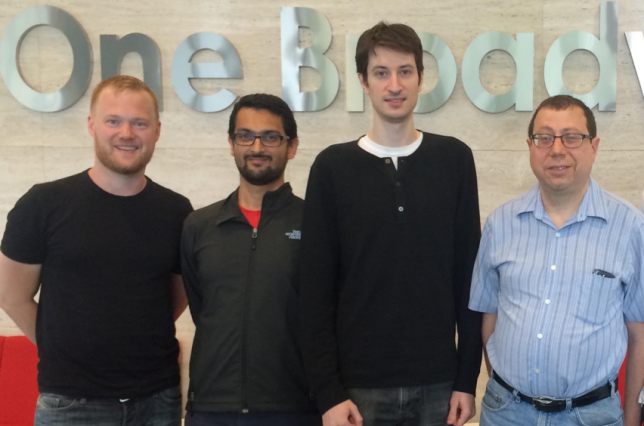| Julia Makes Its Debut in TIOBE Top 20 |
| Written by Janet Swift | |||
| Monday, 07 August 2023 | |||
|
The August 2023 TIOBE Index is published today and records the fact that Julia, a dynamic language for technical computing that runs MATLAB and R-style programs and has achieved popularity among the scientific computing community, is included in the top 20 for the very first time. For a young language this is a remarkable achievement. The TIOBE Index ranks languages in terms of their popularity and ratings, calculated using Google, Bing, Yahoo!, Wikipedia, Amazon, YouTube and Baidu are based on the number of skilled engineers world-wide, courses and third party vendors. The methodology used results in a very spiky curve for any individual language. Here's Julia's from its first entry in the TIOBE index until now.
Notice that it made a fairly steady ascent in terms of share from its first recorded appearance in November 2013 when it had a share of 0.02% until November 2017 when it achieved 0.6%. However it then took a sharp tumble down to 0.19% in February 2018. After a prolonged zigzag around 0.25% it reached a low of 0.17% in February 2020, where it remained for 2 months before a rapid rise to 0.73% in January 2021, which was followed by a slump/ partial recovery pattern. In March 2023 it was at a low point of 0.29% and now after five months in which it experienced an increased share has reached 0.85%, enough to propel it into 20th position in the table. TIOBE Software CEO and maintainer of the index Paul Jansen writes: "Born about 13 years ago, Julia is a really young programming language. So what makes Julia unique? Why does it deserve this top 20 position? Julia is especially used in the data science and mathematical computation world. But we already have got top 20 contenders in this field such as Python, R and MATLAB. So why then Julia? Well, Julia is faster than Python, more suitable to write large systems in it than R and less expensive than Matlab. So, speed, scalability and being open source make Julia an attractive alternative." The TIOBE index has followed Julia's progress from it being a very new language. For example, in December 2014 in R Heads For Top Ten Languages, reporting that the statistical language R moved up to 12th place in the TIOBE index by making a jump of about three times its normal variation, Jansen included Julia in his commentary: To put this into perspective other statistical languages don't get anywhere near - S 84, SAS 21, SPSS 104, Julia 126, LabView 63, Mathematica 80 and Matlab 24. Another notable mentions came in 2015 when we reported that as a result of the adoption of an improved algorithm to remove statistical noise: Julia made one of the biggest leaps going from 107th in August to 72nd in September. In August 2017, when we reported that eight of the languages in the top ten were showing a downward trend, Julia in 46th place was singled out as one of the languages that was doing well. Julia had made its first appearance in 2012 but in fact its development began in 2009 by MIT professor of Computer Science Alan Edelman with his students Jeff Bezanson, Stefan Karpinski, Viral B. Shah. At its launch in a blog post Why We Created Julia this team wrote: We want a language that’s open source, with a liberal license. We want the speed of C with the dynamism of Ruby. We want a language that’s homoiconic, with true macros like Lisp, but with obvious, familiar mathematical notation like Matlab. We want something as usable for general programming as Python, as easy for statistics as R, as natural for string processing as Perl, as powerful for linear algebra as Matlab, as good at gluing programs together as the shell. Something that is dirt simple to learn, yet keeps the most serious hackers happy. We want it interactive and we want it compiled. Our initial coverage of Julia came in January 2014 when we reported on the availability of Julia Studio an open source IDE for Julia which also included built-in support for version control with GIT and makes it easy to create data visualizations using standard Julia packages and which was bundled with Julia 0.2. To provide a description of Julia we relied on Forio, which produced Julia Studio: Julia marries the performance of low-level languages like C/C++ with a simple and easy-to-understand syntax. You get all kinds of goodies. Julia integrates best-of-breed C and Fortran libraries for statistics, linear algebra, signal processing, and random number generation. It's also designed out of the box for parallel computing, meaning it's easy to scale computation across multiple processors in the cloud. In 2015 we covered the release of Julia 0.4 and a year later reported Julia has been given $600K by the Moore Foundation to get the dynamic language to a production version - something we then covered in Julia 1.0 Released in 2018. Our most recent report was of Julia 1.9 in May 2023. Pictured left to right, Stefan Karpinski, Viral Shah, and Jeff Bezanson. Julia's fourth co-creator, Professor Alan Edelman, is at the far right. In 2019 we reported a different success for Julia when three of its co-creators, Stefan Karpinski, Viral Shah, and Jeff Bezanson were recipients of the 2019 James H. Wilkinson Prize for Numerical Software, which is awarded every four years to recognize innovative software in scientific computing by researchers in the early stages of their careers. The award recognized Julia as: “an innovative environment for the creation of high-performance tools that enable the analysis and solution of computational science problems.”
More InformationRelated ArticlesJulia Language Creators Awarded Numerical Software Prize Julia 1.9 Adds Native Code Caching Julia Studio - An IDE For Julia To be informed about new articles on I Programmer, sign up for our weekly newsletter, subscribe to the RSS feed and follow us on Facebook or Linkedin.
Comments
or email your comment to: comments@i-programmer.info |
|||
| Last Updated ( Wednesday, 09 August 2023 ) |





